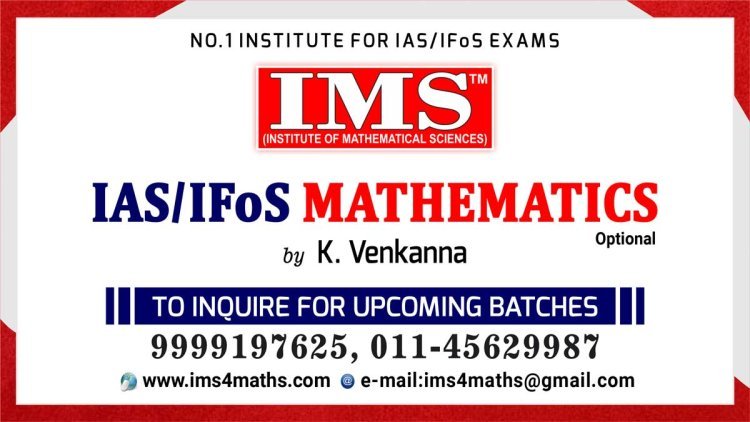UPSC Maths Optional Syllabus 2025 for Mains Paper 1 & 2
The UPSC Mathematics Optional Syllabus for Optional Paper 1 & 2 is divided into two papers, each carrying 250 marks, making a total of 500 marks. Mathematics is often preferred by aspirants with a strong mathematical background due to its logical and numerical approach.

UPSC Maths Optional Syllabus 2025 for Mains Paper 1 & 2
The UPSC Maths Optional Syllabus 2025 for Mains Paper 1 & 2 is a crucial element for aspirants selecting mathematics as their optional subject. Mathematics is considered a scoring subject because of its objectivity and straightforward nature. This blog will provide a detailed analysis of the UPSC Maths Syllabus 2025, including Paper 1 and Paper 2, benefits of choosing this subject, preparation strategies, recommended books, and frequently asked questions.
UPSC Maths Syllabus 2025
The UPSC Mathematics Optional Syllabus for Optional Paper 1 & 2 is divided into two papers, each carrying 250 marks, making a total of 500 marks. Mathematics is often preferred by aspirants with a strong mathematical background due to its logical and numerical approach.
RECOMMENDED BOOK MATHEMATICS OPTIONAL For IAS/IFoS FOR PAPER-I & PAPER-II ⇒ CLICK HERE
UPSC Mathematics Syllabus for Optional Paper 1
Paper 1 of the UPSC Mathematics Optional Syllabus 2025 consists of the following topics:
- Linear Algebra – Vector spaces, matrices, rank, eigenvalues, and eigenvectors.
- Calculus – Limits, continuity, differentiability, maxima-minima, Taylor series, and integrals.
- Analytic Geometry – Cartesian and polar coordinates, conic sections, and 3D geometry.
- Ordinary Differential Equations – First and higher-order differential equations, singular solutions.
- Dynamics & Statics – Equilibrium, motion, projectiles, and central orbits.
- Vector Analysis – Gradient, divergence, curl, line, surface, and volume integrals.
UPSC Maths Optional Syllabus 2025 for Paper 2
Paper 2 consists of advanced topics in mathematics, including:
- Modern Algebra – Groups, rings, and fields.
- Real Analysis – Sequences, series, continuity, and differentiability.
- Complex Analysis – Complex numbers, Cauchy’s theorem, and contour integration.
- Linear Programming – Simplex method, duality, and game theory.
- Partial Differential Equations – Heat and wave equations, Laplace equation.
- Numerical Analysis & Computer Programming – Errors, numerical methods, programming basics.
- Mechanics & Fluid Dynamics – Navier-Stokes equations, Bernoulli’s theorem, equations of motion.
Benefits of Choosing Mathematics as an Optional Subject
Mathematics is a high-scoring subject compared to humanities subjects because:
- It is objective, with definite answers.
- There is no scope for subjective interpretation.
- Questions are based on logic and formulas rather than opinion.
- Previous toppers have consistently scored well in this subject.
- There is minimal overlap with the General Studies papers, allowing for focused preparation.
UPSC Maths Optional Syllabus Preparation Strategy
To master the UPSC Mathematics Optional Syllabus, follow this strategy:
- Understand the Syllabus – Go through the entire syllabus and break it into smaller sections.
- Master the Fundamentals – Strengthen basic concepts before moving on to complex topics.
- Solve Previous Year Papers – Practice past UPSC Mathematics papers to understand question patterns.
- Revise Regularly – Make short notes and revise them periodically.
- Practice Mock Tests – Solve full-length tests to improve speed and accuracy.
- Focus on High-Scoring Topics – Prioritize topics like Linear Algebra, Calculus, and Mechanics.
Books to Study for UPSC Mathematics Optional Syllabus 2025
To prepare effectively, aspirants should refer to the following books:
- Linear Algebra – Hoffman and Kunze
- Calculus – Thomas and Finney
- Analytic Geometry – Shanti Narayan
- Ordinary & Partial Differential Equations – MD Raisinghania
- Vector Analysis – Murray Spiegel
- Modern Algebra – Gallian
- Real Analysis – Bartle and Sherbert
- Complex Analysis – Churchill and Brown
- Numerical Analysis – Jain and Iyengar
- Mechanics & Fluid Dynamics – Landau and Lifshitz
How to Approach UPSC Maths Optional Syllabus?
- Develop Conceptual Clarity – Understand theorems and their applications.
- Practice Regularly – Mathematics requires problem-solving skills, so regular practice is key.
- Use Shortcut Techniques – Learn smart calculation techniques to save time in the exam.
- Time Management – Allocate time for each topic based on its weightage in the syllabus.
- Seek Guidance – Join coaching classes or online programs for expert advice.
UPSC Maths Optional Syllabus FAQs
1. Is Mathematics a good optional subject for UPSC?
Yes, mathematics is a good optional subject for those with a strong mathematical background, as it is highly scoring and objective.
2. Can I choose mathematics as an optional without an engineering background?
Yes, but it is advisable to have a strong grasp of mathematical concepts from graduation-level studies.
3. How much time is required to prepare for UPSC Maths optional?
On average, 6–8 months of dedicated study is required to complete the syllabus and practice adequately.
4. Are NCERT books sufficient for UPSC Mathematics Optional?
No, NCERT books provide a foundation, but advanced-level books are necessary for in-depth preparation.
5. Which part of the UPSC Maths syllabus is more scoring?
Linear Algebra, Calculus, and Modern Algebra are generally considered high-scoring sections.
By understanding the UPSC Maths Optional Syllabus 2025 for Mains Paper 1 & 2, aspirants can strategically plan their preparation and enhance their chances of scoring well in the exam. Stay dedicated, practice rigorously, and ensure conceptual clarity to succeed in the UPSC Mathematics optional paper.

Files
What's Your Reaction?














